Bass CDs
New Album: Ted Russell Kamp, Solitaire
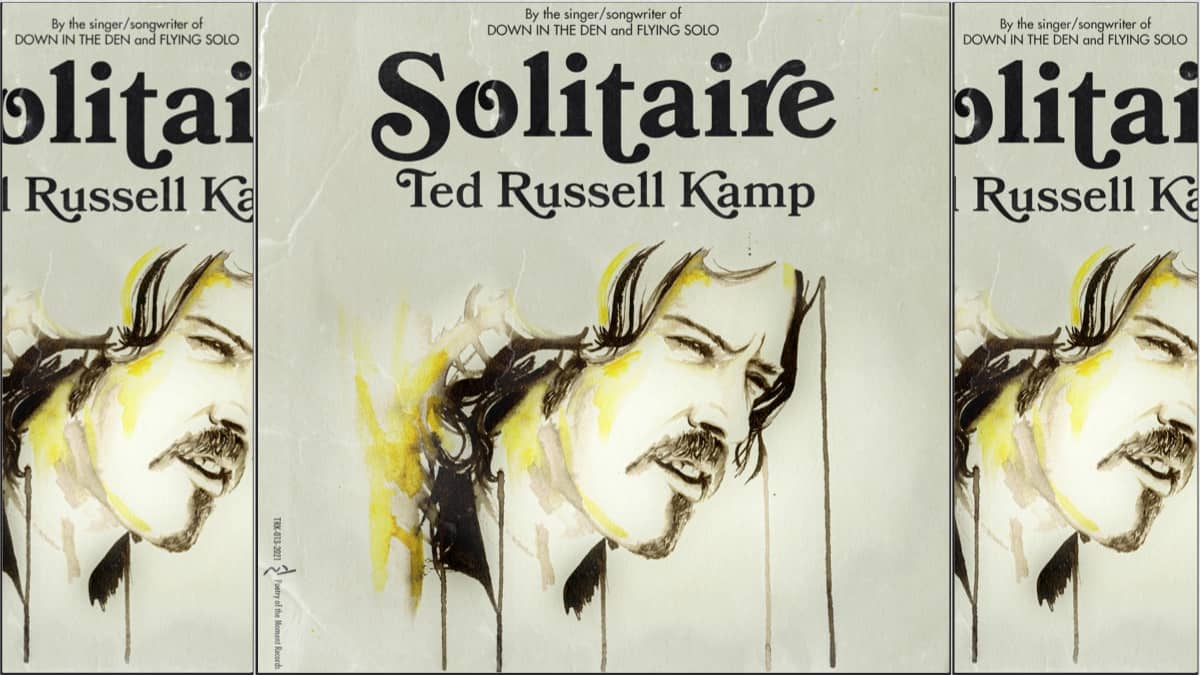
Ted Russell Kamp, Solitaire: Seeking Comfort In Soulful New Music During These Hard Times…
Before the pandemic, Ted Russell Kamp traveled the world playing about 200 shows a year, playing his own blend of roots and Americana music as well as being the longtime bass player for Shooter Jennings. He also began working as producer in his home studio—The Den – where he has now produced numerous well-received albums for fellow artists such as Emily Zuzik, Funkyjenn, AJ Hobbs, Creekwood, Brian Spence, Travis Napier, Rayna Day, Richie Allbright, Grant Langston and more. When the pandemic hit, it was The Den where Kamp found his haven to craft and cultivate the songs that would become his latest record.
Solitaire is Kamp’s 13th full album release. It consists of 14 songs recorded mostly alone at home during the last 9 months of the lockdown. The songs and overall feel of the album have a more intimate and singer-songwriter quality. Kamp wanted them to sound more like solo performances, but with some extra spice added, reflecting the loneliness of being at home in quarantine: isolated from friends and the chance to play live. “I think it echoes what a lot of us have been going through this year; the loneliness and doubt as well as the day dreaming and not wanting to give up. I wanted to put these songs out there because we have all been going through similar things.”
The music on Solitaire is indeed 90% Kamp as he plays a majority of the instruments on the album but he has again collaborated with several artists and friends known in the Americana genre, but this time remotely. “Almost everything I did was in my studio with all of the guest overdubs recorded by them in their own home studios. This was a true quarantine record in that sense. Most played or sang harmony on just the songs I wrote with them.” But to create the sound of a full band at times, Kamp had “just a few socially distant recording sessions, with John Shreffler (harmony vocals, pedal steel), Jim Doyle (drums) and Brian Whelan (harmony vocals) to be a part of several tracks of the album. It was an incredible breath of fresh air to actually see friends again and to reconnect and play with them.”
The first track on the album, “My Girl Now” was actually a song co-written several years ago by Kamp and Micky Braun from Micky and the Motorcars (and was included on their 2014 album, Hearts From Above). Kamp’s version has a less twangy and more buoyant chorus, adding elegance to the song.
“Path of Least Resistance” uses only electric bass and acoustic guitar, giving it a vintage folk feel, and on “You Can Go To Hell, I’m Going To Texas” (written with the ladies of Granville Automatic) you hear a distinctive California country rock sound.
Kamp wrote the gospel-sounding “As Far As The Eye Can See” with pal, Matt Szachetka and is one of the few songs on the record featuring mainly bass and vocals, a minimalist approach that has become one of Kamp’s trademarks. The folky, “Western Wind” was written via a FaceTime session with co-writer Shane Alexander who then sang harmonies on the songs, as well.
“Exception To The Rule” was written with Ed Jurdi (Band of Heathens) on some downtime at a music festival in Mexico they played together last year. They revisited and reworked the song via email and then Ed added his harmony vocals and a delicate George Harrison style slide guitar solo. The bonus track, “Lightning Strikes Twice” is of note, as it’s the first bluegrass song Kamp has written and he played every instrument on the track.
Some of the other artists Kamp collaborates with on Solitaire include; Josh Morningstar, Braid Raisin, Mark Mackay, Tony Scalzo, Pete Murcott and Don Gallardo, but on the title track, Kamp is the only writer and performer—just an acoustic guitar and his vocals with no guests and no overdubbing. “This is one of my favorite songs on the record and from a songwriting perspective, the one I’m most proud of,” he confesses. “I was actually playing a lot of the card game solitaire the first few months of quarantine and thought that it would be a great album title for being at home in a kind of solitary confinement. Then I got the idea to write this song.” At this point in modern life, anyone can relate to these lyrics: “I got something on my mind been trying to find the words–one leads to the next then they scatter like the birds–fighting with a feeling like I’m alone inside a maze–don’t know what’s in the cards but I been circling round for days”.
Kamp’s last album, Down in the Den was a very fully arranged full band record with lots of guests, horns, guest vocalists and instruments, while Solitaire reflects Kamp almost solely on his own. “Knowing I was recording an acoustic, moody record like this also helped me choose the songs that I knew would work well arranged this way,” he explained. “I think it’s very different and speaks to what a lot of us have been going through this year. I wanted each song to feel different so I added mandolin, dobro and banjo to some – and Wurlitzer , accordion and Hammond to others. It’s also the first time I played my old dulcimer on a record. When I start touring again, most of these songs will be great additions to my solo show and some will also be great for my full band electric sets. It was really satisfying using the quarantine to write on my own, but also to co-write and reconnect with friends as we were all going through a hard year.”
Solitaire provides Kamp with yet another approach to his music, but ultimately it’s connecting with his audience that matters to him most.
Visit online at tedrussellkamp.com
Bass CDs
Reissue: Geddy Lee’s My Favourite Headache and Alex Lifeson’s Victor
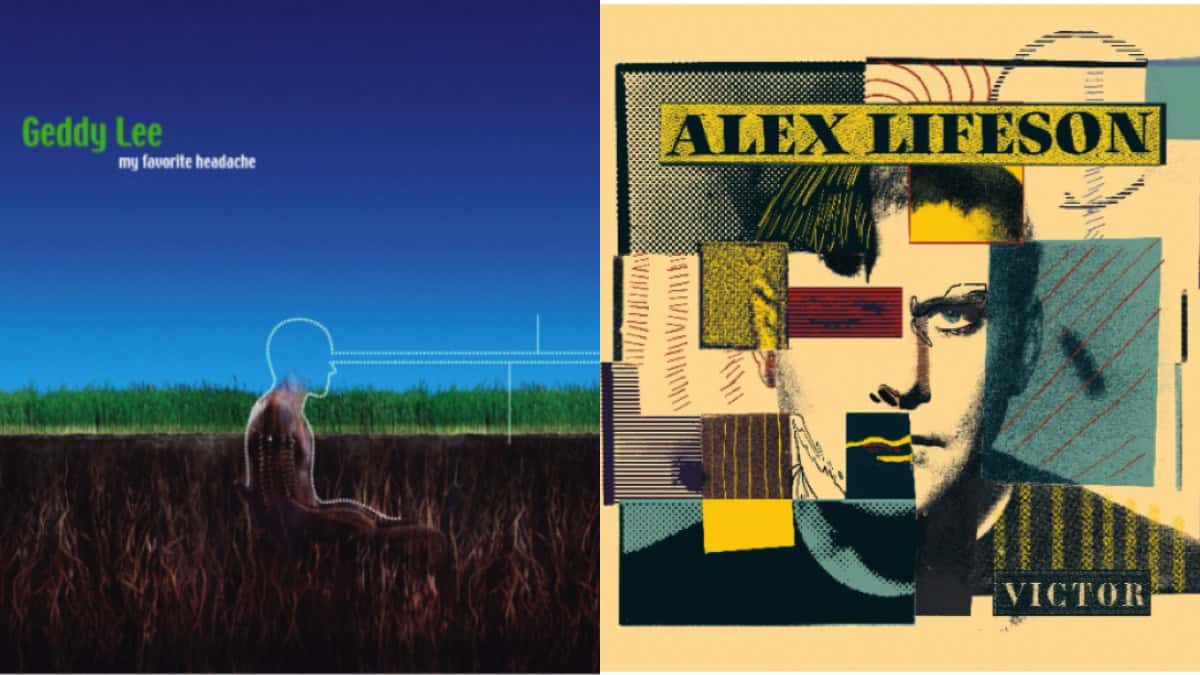
In an exciting announcement for Rush fans and rock enthusiasts alike, Anthem Records in Canada and Rhino Records will reissue the first-ever solo albums of Alex Lifeson and Geddy Lee. Lifeson’s 1996 album Victor and Lee’s 2000 offering My Favourite Headache will be re-released on August 9, 2024, in various formats, including a range of vinyl configurations.
My Favourite Headache, Geddy Lee’s only solo album to date, was initially released on November 14, 2000. This reissue marks its first vinyl pressing since a limited-edition Record Store Day exclusive in 2019. The fourth side of the album features two instrumental mixes. Produced by Lee, Ben Mink, and David Leonard, the album includes contributions from Mink and drummers Matt Cameron (Soundgarden/Pearl Jam) and Jeremy Taggart (Our Lady Peace).
Victor, originally released on January 9, 1996, marks Alex Lifeson’s solo debut. Lifeson took on the roles of songwriter, producer, and mixer for this album. For the first time, Victor will be available on vinyl, featuring a complete remix by Lifeson himself to enhance the audio quality. The fourth side of the album includes four instrumental tracks previously exclusive to Lifeson’s website. Guest artists include lead vocalist Edwin from I Mother Earth, Primus bassist Les Claypool, and Canadian powerhouse vocalist Lisa Dalbello. The 15-song collection is paired with striking 2024 reimagined artwork by Fantoons Animation Studios.
For more details on the Geddy Lee reissue and to preorder, https://lnk.to/MyFavouriteHeadache
For more details on the Alex Lifeson reissue and to preorder, https://lnk.to/AlexLifesonVictor
Bass CDs
New Album: Ben Wolfe, The Understated
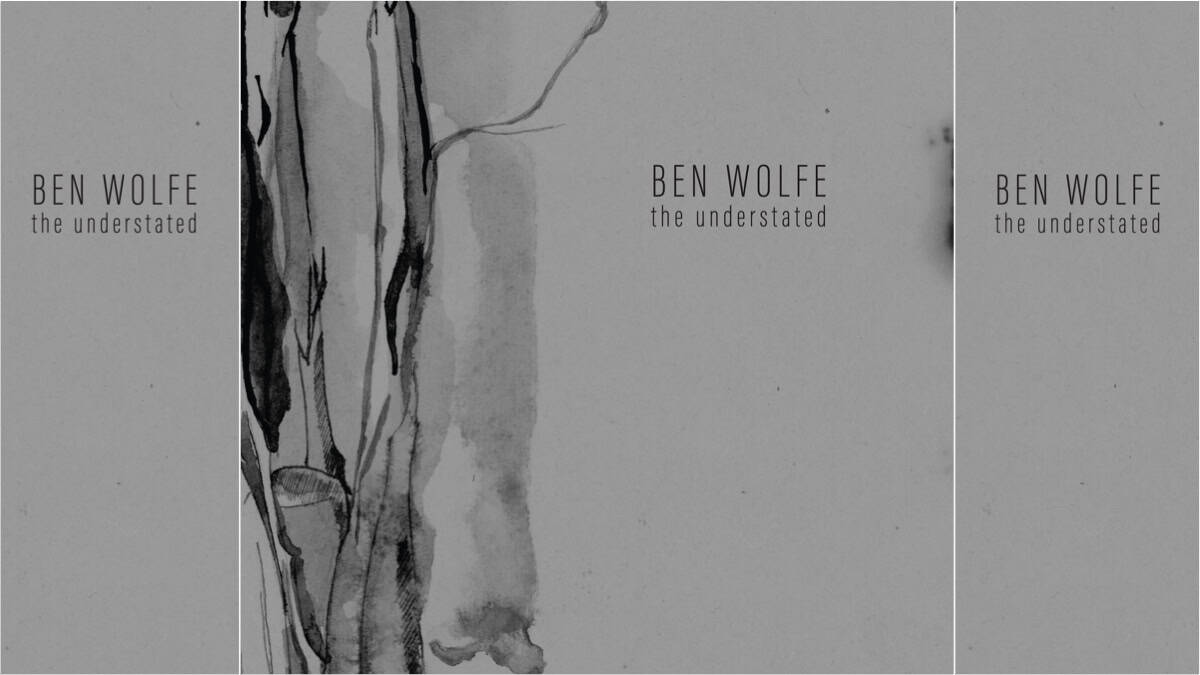
Acclaimed bassist and composer Ben Wolfe is thrilled to announce the August 9, 2024 release of The Understated.
This evocative new album features a collection of new original compositions by Wolfe paired, with re-imaginings of some of the composer’s classic material, with a particular emphasis on the ballad song-form. The album features ten tracks, five of which are ballads – a bold move for any composer – Wolfe creates a cohesive narrative here that challenges the listeners perception of the classic ballad. The Understated features Wolfe alongside artists who make up the very frontline of modern jazz, including pianist Orrin Evans, tenor saxophonist Nicole Glover, drummer Aaron Kimmel, guitarist Russell Malone and pianist Sullivan Fortner.
Wolfe has always been drawn to finding beauty in subtlety. He perceives a certain tranquility and elegance in the Coltrane Quartet, Louis Armstrong’s Hot Fives and Sevens, the legendary Miles Davis bands and rhythm sections, and the music of Charlie Parker. While he, of course, revels at the immense world-building energy of this music, it’s the “other side” – the elusive, magical aspect that endlessly captivates him – the understated. The composer draws inspiration most from the ensemble work of these hallmark jazz ensembles. Despite the individual parts being extraordinarily beautiful on their own, the musicians in these archetypal ensembles play only what is needed to serve the music, paying particular attention to the band-sound more-so than their individual sound. The Understated embodies this ethos with a tremendously impactful ensemble-oriented approach.
Wolfe sought to continue the thread started by “Lullaby in D” from his previous critically acclaimed release Unjust. Wolfe indicates, “Something about that take was so perfect to me. It had been brought to life, and it had that ensemble thing.” Wolfe assembled the quartet who recorded “Lullaby” (including longtime collaborator Orrin Evans, as well as recent frequent collaborators Aaron Kimmel and Nicole Glover) and two very special guests, Russell Malone and Sullivan Fortner. The recording process took place in one room with no headphones or isolation booths, further emphasizing the group’s collective awareness.
This record succeeds in bringing Wolfe’s expansive music to life through extremely conscientious group playing. Nothing is forced or pushed; everything that needs to be stated is stated. The single from the album, “Waltz,” encapsulates the spirit of the project. Wolfe says, “I view albums like a complete painting, so singles have been difficult for me. This song is very much in the spirit of the whole but doesn’t give away the record.” The piece features a sentimental melody delivered with grace by tenor saxophonist Nicole Glover, before Glover and Evans embark on stirring solos dancing in and out of the tune’s harmony.
Other new original compositions featured here include “Ballad in B”, which perhaps best demonstrates the group’s stunning cohesion. This tune is a refreshing diversion as it features a serene repeated melody without overt melodic improvisation. The following track, “Anagram”, begins with Kimmel’s rhythmic refrains and a unison melody played by Glover and Wolfe and is a true ensemble piece. On this track, Wolfe shines with a lyrical solo. The moody short interlude “So Indeed” is a lyrical masterwork that leaves the listener wanting even more. “Beautiful You” features master guitarist Russell Malone on the track’s melody. The emphasis here on restrained lyricism is a prime reminder of the old adage “it’s not the notes you play, it’s the notes you don’t play”. Each pocket of space in between melodic moments leaves room for the listener to breathe deeper and deeper into the song. The driving “Triangle Man” features fantastic improvisation from Glover and Kimmel. The tender “Barely Spoken” concludes the album with a feature for pianist Sullivan Fortner.
The album also weaves in references to Wolfe’s past works, creating a personal musical universe. “The Poet Speaks” is the opening track on his first record, 13 Sketches. “Occam’s Razor” was composed years ago for a collaboration with a choreographer and painter, and was a much different composition in its original form. “Love Is Near” was originally found on The Whisperer. With ballads in particular, Ben uses voicings and sounds that represent certain things to him, intentionally referencing his other compositions to generate connections between his songs.
Wolfe’s tremendous compositions on this album are also influenced by the group of musicians that he assembled for this release. Wolfe remarks “One of the things these five musicians share in common is that not only are they true ensemble players, they will always play something unexpected and special.” Listeners will find calm and beauty within the ensemble performances throughout The Understated.
Visit online at benwolfe.com/
Bass CDs
New Album: Orlando le Fleming, Wandering Talk
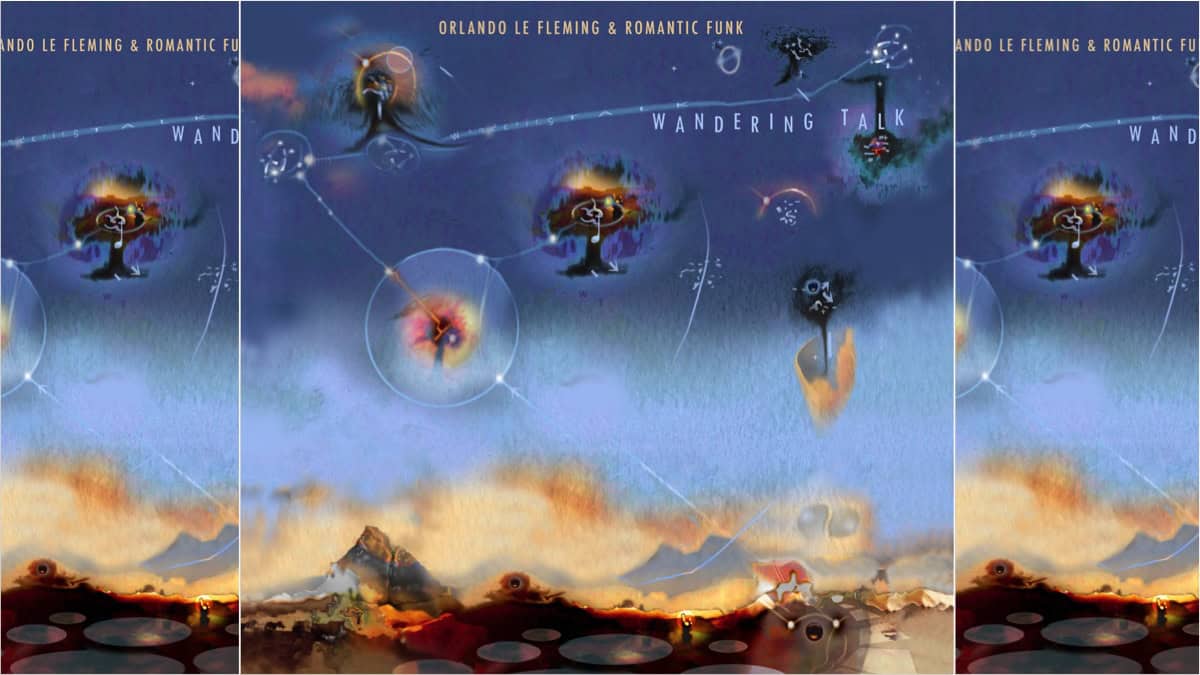
Bassist, band leader, and composer Orlando le Fleming continues to make music that crosses genres as readily as he crosses the Atlantic, with this new album ‘Wandering Talk’, to be released physically on 23rd August via the UK’s premiere jazz label, Whirlwind Recordings.
After 20 years in New York City, he’s back in his native UK, forging new pathways and renewing old partnerships. His love for the acoustic tradition continues unabated alongside his deep affection for the robust, muscular electric fusion that emerged in the 1980s, and he has received critical acclaim from media including The Guardian, Financial Times, Jazzwise, and All About Jazz among others. He has also toured and recorded with some of the world’s greatest jazz musicians including Branford Marsalis, Kurt Rosenwinkel, Antonio Sanchez, Ari Hoenig, and Wayne Krantz.
The Romantic Funk project was born in New York’s legendary 55 Bar to explore that legacy: now the new album ‘Wandering Talk’ builds on the critical acclaim generated by ‘The Unfamiliar’ (2020), building on the framework with a set of collaborators that brings together London and New York, past and present, acoustic, and electric, and merges it all into a spectacular whole.
Following the same principles that served the project in NYC, le Fleming booked four Friday nights at London’s renowned Vortex Club to workshop the music that would become the album, with a rotating cast of players which he honed down into the final line-up. Old London friends Tom Cawley (piano/keys) and James Maddren (drums) completed the rhythm section. New acquaintance Nathaniel Facey was picked from the ranks of the UK’s brightest young saxophone players. NYC stalwart Philip Dizack flew in from the US to play trumpet and reaching back to Orlando’s school days and forward to his own family, one-time classmate Chris Martin (Coldplay) and his own daughter Nadia combined to provide vocals on a special setting of Rumi’s poetry.
As before, the music combines fusion’s flash and fire with a contemporary sensibility. This time, Orlando’s questing spirit sends his superb band forward to investigate fresh areas of creativity in dynamic and texture.
Visit online at orlandolefleming.com
Bass CDs
Album: John Entwistle, Rarities Oxhumed – Volume Two
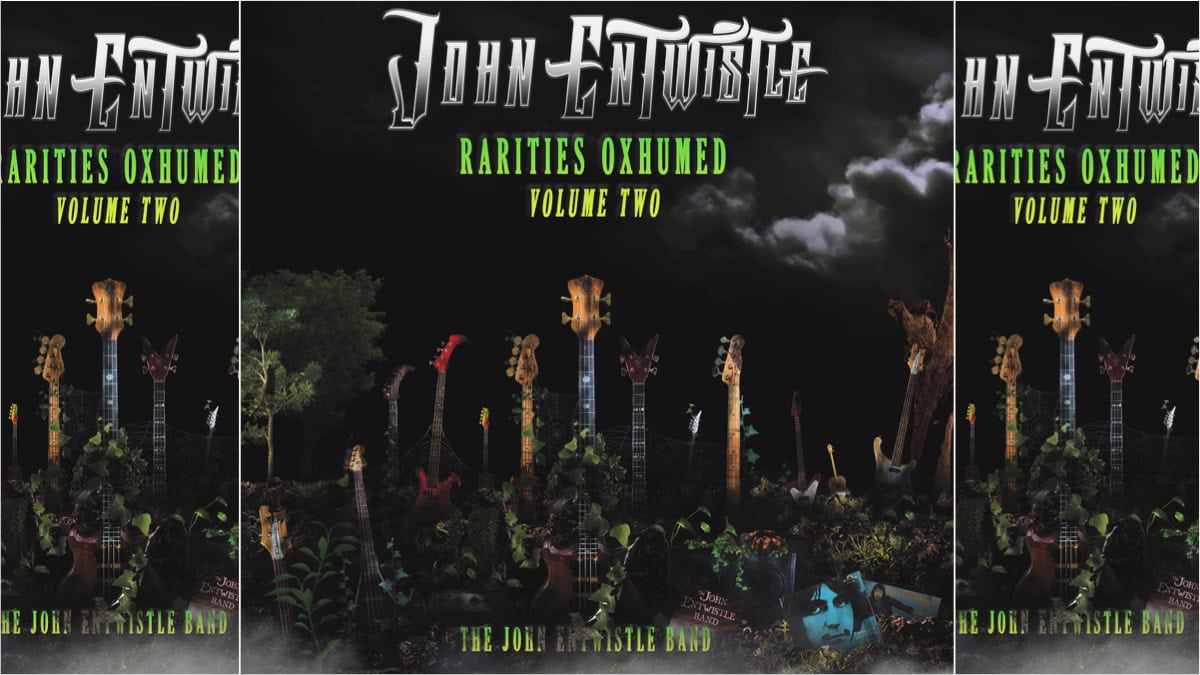
Album: John Entwistle, Rarities Oxhumed – Volume Two
Rarities Oxhumed – Volume Two is the second of the series of posthumous releases coming from John Entwistle.
Rarities Oxhumed – Volume Two is a compilation that was curated by drummer Steve Luongo, who served as John Entwistle’s producer, bandmate, business partner and good friend for many years. As Luongo states, “When I agreed to do two volumes of John Entwistle rarities, I knew volume two had to be even better than volume one. It is!” The collection of songs on Volume Two are from his years with the John Entwistle Band and include re-mastered versions of studio tracks including “Endless Vacation”, alternate mixes of tracks like “Sometimes”, and live tracks including The Who cuts “Real Me”, “Long Live Rock” and an epic version of “Young Man Blues”. The latest preview track to be released is the Who cut “Had Enough.”
Listen to “Had Enough” here: push.fm/ps/hadenough
Rarities Oxhumed – Volume One was quickly embraced by longtime fans as it featured gems like “Bogey Man” featuring Keith Moon, “Where You Going Now” (demo for the Who), and a raw live version of “Trick of the Light” recorded during the John Entwistle Band’s final tour in 2001. Deko Entertainment is thrilled to have been able to bring both volumes of this unearthed music of John Entwistle to the fans and forever solidify him as one of the greatest rock musicians ever.
For more information, visit online at dekoentertainment.com/john-entwistle
Bass CDs
Album Review: Mark Egan, Cross Currents
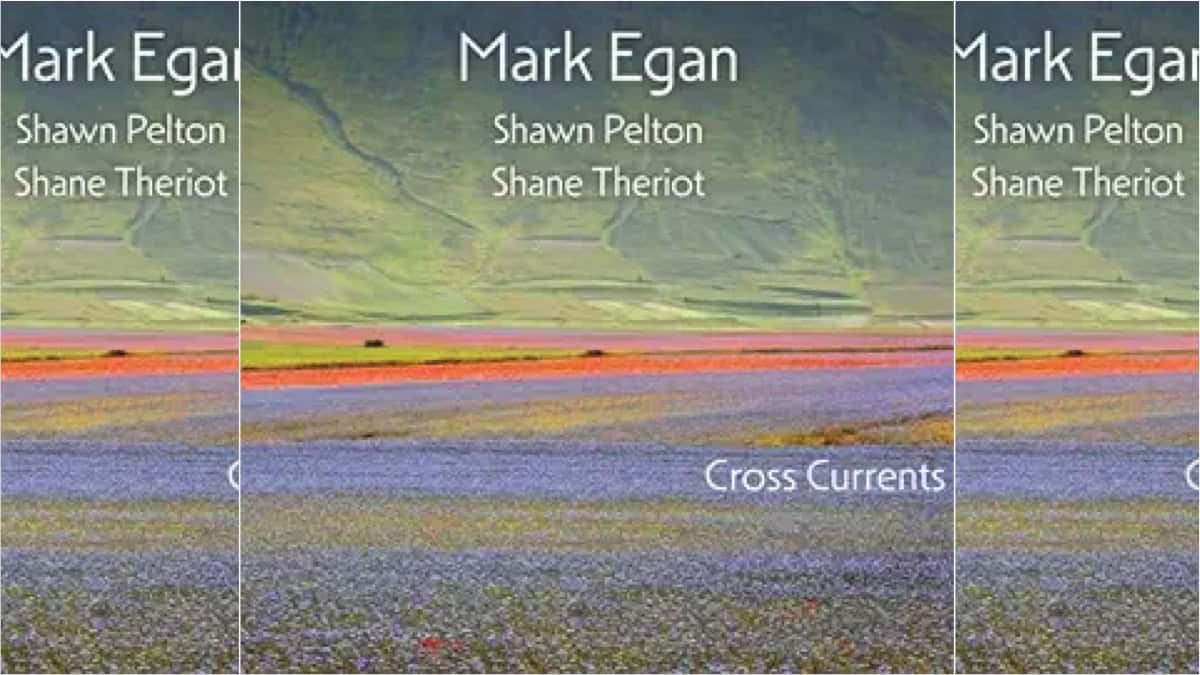
Mark Egan, Cross Currents…
It is exciting every time I get a new album from Mark Egan as he is such an amazingly versatile player and I never know what to expect (except for excellent artistry!) In his latest release, Mark has teamed up with Shawn Peyton on drums and Shane Theriot on guitar to bring us “Cross Currents”.
This collection of eleven tracks transports me to the Gulf Coast (New Orleans specifically). Mark’s fretless basses lay down a solid groove and lots of juicy solo work for this rootsy collection of funk, ambient, swamp-rock, second line, ballads, Cajun and even Indian Raga.
This trio is super-tight and the musicianship is flawless as each member has ample opportunity to shine. Even though each player is very talented in their own right, I feel that the collective energy is greater than just the sum of the players on this album. Each musician contributed to composing music for this project but the lion’s share are Mark’s original pieces.
I spent the summer of 1981 in New Orleans and this wonderful music takes me back to those fond memories. I participated in a wacky raft race on Lake Ponchatrain and this opening track elicits images of fun, sunshine, music, and great food.
This is another superb album that everyone will enjoy. Get your copy today! Cross Currents is available online at Amazon.com. Visit Mark online at markegan.com.











